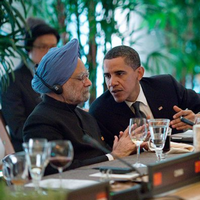In advance of President Barack Obama's visit to India next month, the administration is sending signals about great and wondrous changes ahead in the Indo-American relationship. But in reading Lalit K. Jha's dispatch from Washington, a term I have come to dread in foreign policy rhetoric made its predictable appearance: Obama's visit is supposed to herald the establishment of a "true strategic partnership."
"Strategic partnership" entered the U.S. diplomatic lexicon as a way to find a halfway house between those countries that are formal American allies -- especially those for whom this status is a matter of treaty and Congressional statute -- and countries that might otherwise not be hostile to Washington but who did not enjoy any special or privileged relationship with the United States. The problem, however, is that "strategic partnership" was often applied as a catch-all diplomatic term devoid of real practical applications.
The concept was originally drafted into service in the context of post-Soviet U.S.-Russia relations, to provide a basis for cooperation between Washington and Moscow. But comforting talk about Russia and the United States being "strategic partners" often vanished when the relationship ran into real difficulties, particularly after Russia's power began to resurge. Similarly, Georgia's status as a "strategic partner" was a way to promote the illusion that Tbilisi was joining the Euro-Atlantic world. But Georgians keenly felt the absence of concrete security guarantees in the aftermath of the 2008 Georgia-Russia war.

